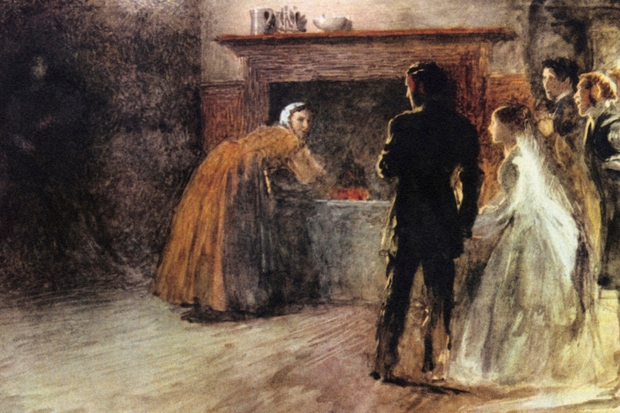Medea says ‘hiiiiiiii’ on the first page of Mallory Ortberg’s hilarious book, which puts smartphones in the hands of literary heroes, heroines and their writers; ‘it’s Glauce right??’, Medea continues, squealing ‘when is the WEDDING/ I hope you guys have the Argonauts as groomsmen/ and they do the sword thing/ you know where they make the little roof with their swords/ and you run down underneath it’.
From this startling opening, Ortberg romps through the canon. Hamlet has teenage tantrums about the sandwiches his mother brings up on a tray. Keats gushes about ‘THIS URN’ and Mrs Danvers upbraids Rebecca for bringing in ‘BAGGED tea?/ this is a stately home/ like OF ENGLAND/ this house has an actual name/ you don’t even have a name’.
As co-founder of the online magazine The Toast, Ortberg has made a speciality out of deliciously wicked writing, such as her series Women in Western Art History (where she wonders what the dead-eyed nudes are really thinking), her Male Novelist Jokes (dismantling the pretensions of both the novelists and the literary establishment) and her Literary Trysts It Gives Me Great Joy to Think About (such as Oscar Wilde and Walt Whitman).
Imagining texts with or between literary greats is another clever conceit but Ortberg also has something to say about how women read. In the stories she retells, the heroines are not always centre stage and often don’t get what they want. Her Jane Eyre is caught between Rochester texting ‘DID YOU LEAVE BECAUSE OF MY ATTIC WIFE’, and vowing ‘MY HOUSE IN FRANCE DOESN’T EVEN HAVE AN ATTIC IF THAT’S WHAT YOU WERE WORRIED ABOUT’ and St John Rivers slyly saying, ‘I hope you’re packed for India already’ and when she says she is not going, yelling, ‘That’s not what these TWO TICKETS TO INDIA say’. Jane tries truth-telling, sarcasm, deadpanning and silence, but she can’t win because these men aren’t listening.
In making this her title piece, Ortberg nods towards other feminist revisionism, such as Sandra Gilbert’s and Susan Gubar’s The Madwoman in the Attic, and Ortberg’s ridicule is informed by the resistant reading women do all the time, subverting and rewriting stories, gender-flipping, spoofing, writing in the gaps. It has been estimated that 95 per cent of fan fiction is written by women, and Ortberg’s book is confidently in that tradition, but it also offers the kind of geeky pleasures found in John Sutherland’s entertaining and illuminating Puzzles in Classic Fiction series; it is loving, knowing and, most of all, playful.
And yes, sometimes the satire can be a bit glib but mostly this is savagely funny, and empowering too. I wish Jo from Little Women really had said out loud what she truly thought about her sister getting married, instead of being nice and resigned about it: ‘You still have three hours to change your mind,’ she says, ‘we could run away and be pirates / or just wear bloomers.’ Heathcliff and Cathy make complete sense as a pair of lovers who enjoy tormenting each other (‘I’m going to love you so much / i become a ghost,’ says Cathy, ‘but i’m never going to haunt you/ just that guy who’s visiting from london’). And it is provocative to imagine a version of Pride and Prejudice where Lizzie Bennet explains, patiently, over and over, that none of the men can come to the ball because they are all at war.
Like all the best storytellers, Ortberg asks more questions than she answers.
Available from the Spectator Bookshop, £10.99 Tel: 08430 600033






Comments